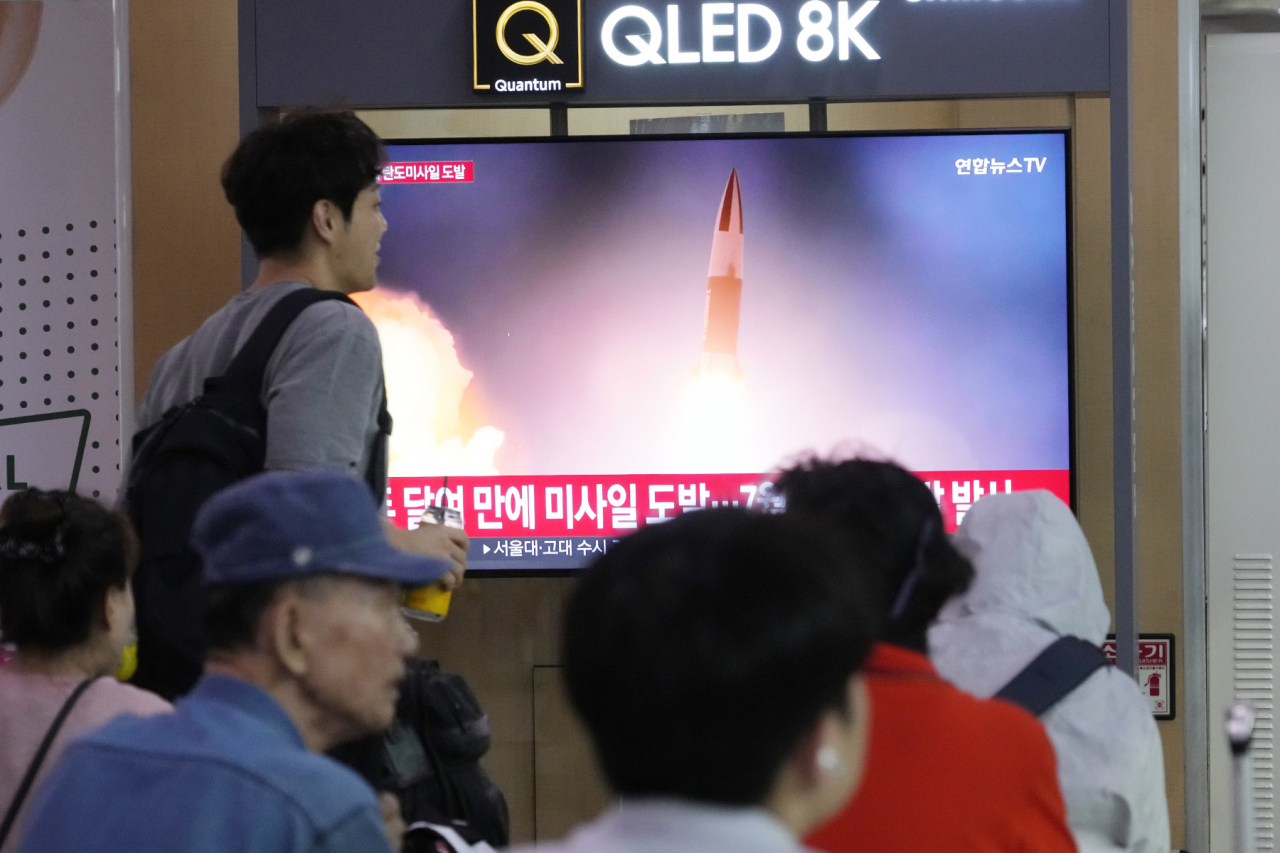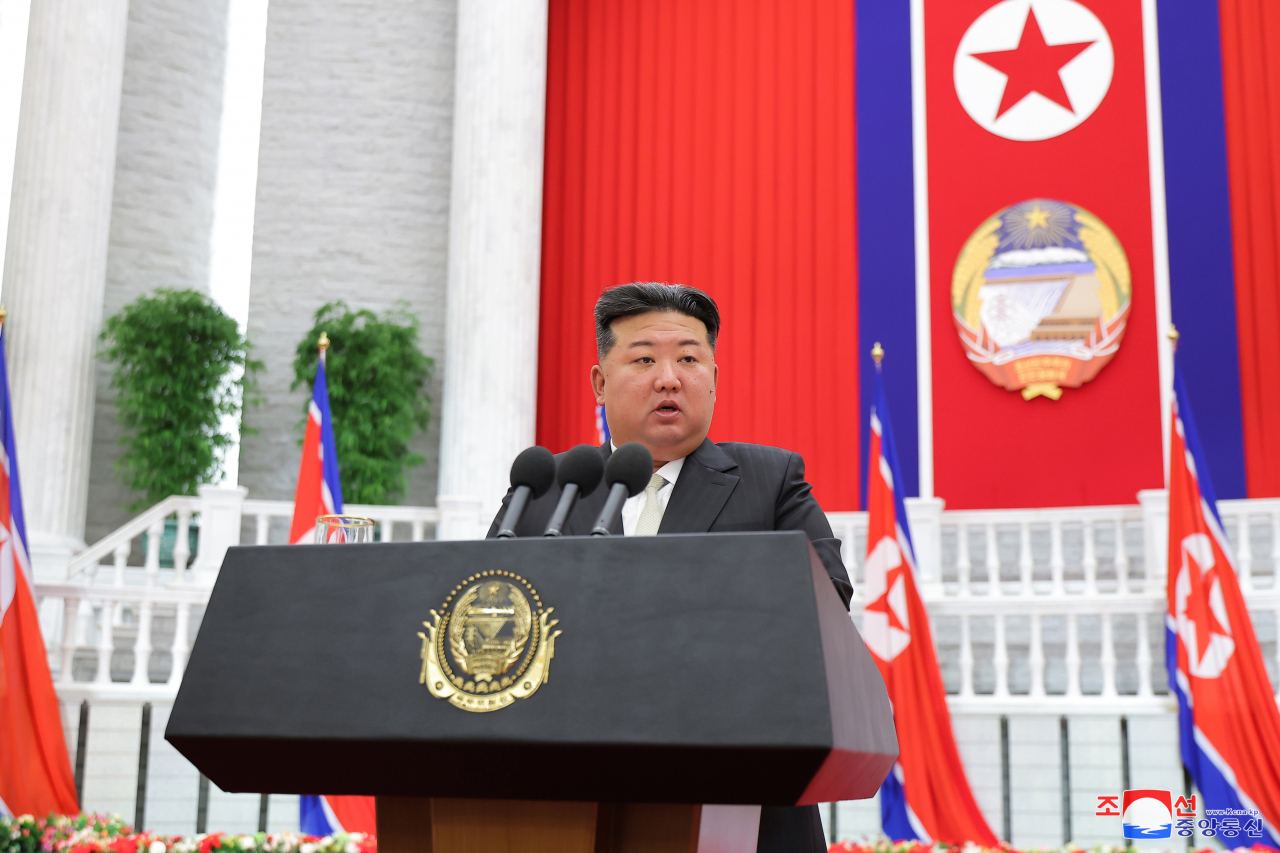
 > National > North Korea
> National > North Korea
 |
| A TV screen shows a file image of North Korea's missile launch during a news program at Seoul Railway Station in Seoul, South Korea, Thursday. (AP) |
North Korea fired multiple short-range ballistic missiles into the East Sea from the Pyongyang area Thursday morning, the South Korean military said, marking its first missile launch since July 1 and breaking a more than two-month lull in missile provocations.
The timing -- coinciding with weeklong Russia-China military exercises, just one day after the US presidential debate, and as North Korea shifts its focus from flood recovery back to weapons development -- signals what analysts view as a calculated, multi-pronged strategy to advance both domestic priorities and broader global geopolitical objectives.
Hong Min, a senior research fellow at the government-funded Korea Institute for National Unification, said "North Korea joined the show of force as the large-scale China-Russia joint military exercises commenced."
Russia’s large-scale military drills, dubbed Ocean-2024, feature Chinese aircraft and warships and are scheduled to run from Tuesday through Sept. 16 across the Pacific and Arctic oceans as well as the Mediterranean, Caspian and Baltic seas.
"North Korea is not officially participating in the combined exercises between China and Russia. However, it can be seen that North Korea, in its own way, is aligning itself with the China-Russia exercises, conducting parallel drills aimed at countering the United States," Hong added.
Experts noted that Pyongyang's missile launches came less than 24 hours after the first US presidential debate between former President Donald Trump and Vice President Kamala Harris on Tuesday night, during which North Korean issues were largely overlooked.
"The timing of the launches, immediately following the US presidential debate, suggests this could be the first step in North Korea's attempt to interfere in the election. We can expect an escalation in the level of provocations moving forward," said Yang Moo-jin, a professor at the University of North Korean Studies in Seoul.
Seoul and Washington also braced for the possibility of North Korea launching provocations around the US presidential election in November at the high-level meeting of the Extended Deterrence Strategy and Consultation Group on Sept. 4.
Kim Yong-hyun, a professor of North Korean studies at Dongguk University, remarked that the missile launches suggest "North Korea is paying attention to the ongoing US presidential election."
“North Korea seems to be making moves to assert its presence in the US presidential election,” Kim told The Korea Herald.
 |
| North Korean leader Kim Jong-un delivers a speech in Pyongyang on Monday marking the 76th foundation anniversary of North Korea, in this photo provided by the North's official Korean Central News Agency the following day. (Yonhap) |
Kim also pointed out the possibility that these missile launches could be linked to North Korea’s arms exports to Russia, intended for use in the Ukraine conflict.
Echoing the view, Yang explained, "It’s also likely that North Korea launched various missiles to test weapon systems that could be supplied to Russia, particularly as the Russia-Ukraine war has escalated recently."
Lim Eul-chul, a professor of North Korean studies at Kyungnam University in Seoul, observed that North Korea’s missile launches indicate a deliberate shift back to weapons development, in line with North Korean leader Kim Jong-un's five-year military development plans revealed at the 2021 Eighth Party Congress. The strategy laid out an ambitious road map for advancing the regime's military arsenal.
The shift follows a temporary focus on flood recovery efforts, signaling that North Korea is now returning to its planned trajectory of weapons development.
“This doesn’t seem to be an extraordinary provocation. Following the severe flooding that began in late July, North Korea channeled all its resources into recovery efforts," Lim told The Korea Herald. "Although the recovery is not yet fully complete, it’s nearing its final stages. Consequently, the country now appears to be refocusing on unfinished military objectives. This is the lens through which we should view the current situation.”
Kim Jong-un on Monday pledged to "continuously strengthen the country's nuclear capabilities and redouble efforts and measures to ensure that the entire armed forces of the country, including nuclear power, are in a state of full combat readiness" in his speech delivered to mark the 76th founding anniversary of the regime.
Kim from Dongguk University also explained, "Internally, North Korea is grappling with flood damage, which appears to be driving efforts to bolster domestic unity (through missile launches)."
The Unification Ministry on Thursday criticized North Korea’s actions, stating, "Particularly in a situation where flood recovery is urgent, persisting with such provocations only exposes the regime’s 'people-first' propaganda as hollow rhetoric."
Since May, North Korea has been sending trash-filled balloons toward South Korea, with the latest failed attempt on Wednesday night seeing the balloons drift back into North Korean territory.
Pyongyang also has been broadcasting strange, grinding noises through loudspeakers directed at South Korean people near the inter-Korean border area of Incheon -- a tactic that Seoul views as unprecedented. The activity, which began in late July, has intensified over the past week, according to military authorities.








